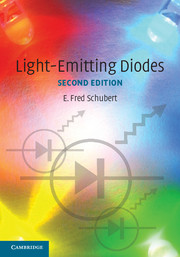Book contents
- Frontmatter
- Contents
- Preface
- 1 History of light-emitting diodes
- 2 Radiative and non-radiative recombination
- 3 Theory of radiative recombination
- 4 LED basics: Electrical properties
- 5 LED basics: Optical properties
- 6 Junction and carrier temperatures
- 7 High internal efficiency designs
- 8 Design of current flow
- 9 High extraction efficiency structures
- 10 Reflectors
- 11 Packaging
- 12 Visible-spectrum LEDs
- 13 The AlGaInN material system and ultraviolet emitters
- 14 Spontaneous emission from resonant cavities
- 15 Resonant-cavity light-emitting diodes
- 16 Human eye sensitivity and photometric qualities
- 17 Colorimetry
- 18 Planckian sources and color temperature
- 19 Color mixing and color rendering
- 20 White-light sources based on LEDs
- 21 White-light sources based on wavelength converters
- 22 Optical communication
- 23 Communication LEDs
- 24 LED modulation characteristics
- Appendix 1 Frequently used symbols
- Appendix 2 Physical constants
- Appendix 3 Room temperature properties of III–V arsenides
- Appendix 4 Room temperature properties of III–V nitrides
- Appendix 5 Room temperature properties of III–V phosphides
- Appendix 6 Room temperature properties of Si and Ge
- Appendix 7 Periodic system of elements (basic version)
- Appendix 8 Periodic system of elements (detailed version)
- Index
Preface
Published online by Cambridge University Press: 05 September 2012
- Frontmatter
- Contents
- Preface
- 1 History of light-emitting diodes
- 2 Radiative and non-radiative recombination
- 3 Theory of radiative recombination
- 4 LED basics: Electrical properties
- 5 LED basics: Optical properties
- 6 Junction and carrier temperatures
- 7 High internal efficiency designs
- 8 Design of current flow
- 9 High extraction efficiency structures
- 10 Reflectors
- 11 Packaging
- 12 Visible-spectrum LEDs
- 13 The AlGaInN material system and ultraviolet emitters
- 14 Spontaneous emission from resonant cavities
- 15 Resonant-cavity light-emitting diodes
- 16 Human eye sensitivity and photometric qualities
- 17 Colorimetry
- 18 Planckian sources and color temperature
- 19 Color mixing and color rendering
- 20 White-light sources based on LEDs
- 21 White-light sources based on wavelength converters
- 22 Optical communication
- 23 Communication LEDs
- 24 LED modulation characteristics
- Appendix 1 Frequently used symbols
- Appendix 2 Physical constants
- Appendix 3 Room temperature properties of III–V arsenides
- Appendix 4 Room temperature properties of III–V nitrides
- Appendix 5 Room temperature properties of III–V phosphides
- Appendix 6 Room temperature properties of Si and Ge
- Appendix 7 Periodic system of elements (basic version)
- Appendix 8 Periodic system of elements (detailed version)
- Index
Summary
During the last four decades, technical progress in the field of light-emitting diodes (LEDs) has been breathtaking. State-of-the art LEDs are small, rugged, reliable, bright, and efficient. At this time, the success story of LEDs still is in full progress. Great technological advances are continuously being made and, as a result, LEDs play an increasingly important role in a myriad of applications. In contrast to many other light sources, LEDs have the potential of converting electricity to light with near-unit efficiency.
LEDs were discovered by accident in 1907 and the first paper on LEDs was published in the same year. LEDs became forgotten only to be re-discovered in the 1920s and again in the 1950s. In the 1960s, three research groups, one working at General Electric Corporation, one at MIT Lincoln Laboratories, and one at IBM Corporation, pursued the demonstration of the semiconductor laser. The first viable LEDs were by-products in this pursuit. LEDs have become devices in their own right and today possibly are the most versatile light sources available to humankind.
The first edition of this book was published in 2003. The second edition of the book is expanded by the discussion of additional technical areas related to LEDs including optical reflectors, the assessment of LED junction temperature, packaging, UV emitters, and LEDs used for general lighting applications.
Information
- Type
- Chapter
- Information
- Light-Emitting Diodes , pp. xPublisher: Cambridge University PressPrint publication year: 2006
Accessibility standard: Unknown
Why this information is here
This section outlines the accessibility features of this content - including support for screen readers, full keyboard navigation and high-contrast display options. This may not be relevant for you.Accessibility Information
- 1
- Cited by
